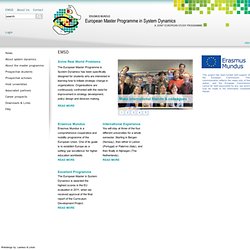

QS World University Rankings - Topuniversities. Self-organization. Self-organization occurs in a variety of physical, chemical, biological, robotic, social and cognitive systems.

Common examples include crystallization, the emergence of convection patterns in a liquid heated from below, chemical oscillators, swarming in groups of animals, and the way neural networks learn to recognize complex patterns. Overview[edit] The most robust and unambiguous examples[1] of self-organizing systems are from the physics of non-equilibrium processes. Self-organization is also relevant in chemistry, where it has often been taken as being synonymous with self-assembly. The concept of self-organization is central to the description of biological systems, from the subcellular to the ecosystem level. European Master Programme in System Dynamics - a joint European study programme. Erasmus Mundus Erasmus Mundus is a comprehensive cooperative and mobility programme of the European Union.

One of its goals is to establish Europe as a setting ‘par excellence’ for higher education worldwide. Read more. Business strategy tools and education. System Dynamics Home Page. Introduction to System Dynamics. Erasmus Mundus Masters in Complex Systems Science. Connecting systems, science and society through: a ground-breaking interdisciplinary research centre pushing the boundaries of knowledge in complexity science; a new generation of scientists trained by the doctoral training centre; the knowledge to understand, control and design complex systems; break-throughs in new applications of complexity science; the solutions to real-world problems with relevant end-user testing; a lively intellectual and practically based environment for complexity science.

Complexity News Wed 27 Jan '16 First MathSys Masters graduates and Complexity Graduation. TEDxRotterdam - Igor Nikolic - Complex adaptive systems. Complex Systems Symposium: Session One Panel. Using Influence in Understanding Complex Systems.